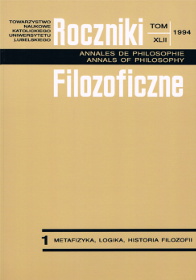The Problem of the Starting Point in N. Malebranche’s Philosophy
Abstract
M. Gueroult is the author of the proposition about the “fall” or “dethronement” of “cogito” in Malebranche’s philosophy. He formulates two different theses on this subject: 1) “cogito” cannot be the starting point in Malebranche’ philosophy since it does not belong to the field of clear and distinct cognition; 2) “cogito” is only one of the possible starting points. Malebranche, as we have tried to prove in the present study, distinctly distinguished the way the soul learns about itself and the way it learns about its own existence. He also did not limit clear and distinct cognition to cognition through ideas. For a clear and distinct cognition of its own existence the soul needn’t have a clear and distinct idea of itself since it is not the indistinct notion it formulates about itself on the basis of the inner feeling that lies at the foundations of this statement, but it is the very fact of thinking; the indubitable fact of thinking is the basis for the statement “I am”. The order of reason determined by the rule of certainty excludes the possibility of recognizing both the existence of God and the theory of perceiving an idea in God as the starting point. The “cogito” as it is understood by Malebranche meets the conditions for being the starting point of his philosophy. However, this does not mean that it has an identical systemic significance as it had in Descartes’ philosophy. For the author of Meditations on First Philosophy “cogito” is the basis for formulating the criterion of the truth. But for Malebranche it is not “cogito” that is such a basis, but it is an analysis of the very act of judgement. Taking this fact into consideration it should be stated that in Malebranche’s philosophy the systemic significance of “cogito” is decreased.
Copyright (c) 1994 Roczniki Filozoficzne

This work is licensed under a Creative Commons Attribution-NonCommercial-NoDerivatives 4.0 International License.





